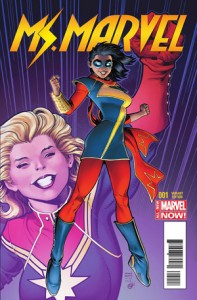2018 School Spending Survey Report
Q&A: Meet the Creator of Ms. Marvel, the First Female American-Muslim Superhero
Hey librarians, here's a chance to introduce your patrons to Marvel's first female American-Muslim superhero. SLJ talks to the creator behind Ms. Marvel, a teenage superhero who fights crime and happens to not eat bacon.

Variant cover of Ms. Marvel/Marvel
Teenager Kamala Khan argues with her parents about why she can’t go to parties, slogs through her homework, and is unsure of herself just like any typical New Jersey teen. However, she is also a superheroine who fights villains and is the star of the comic book series Ms. Marvel (Marvel) released this past February 5. Sixteen-year-old Kamala Khan is Marvel Entertainment’s first Pakistani-American and Muslim superheroine. Perhaps Khan’s biggest draw is that she longs for acceptance. Kamala tries to assimilate into high school life, wishes she could eat bacon (which her family doesn't), and deals with cruel jabs like:"Nobody's going to, like, honor kill you?"Peter Parker and Clark Kent tried in their own ways to lead normal lives. Kamala, too, struggles to find her place in the world. In the process, she fittingly discovers her superpower is shape shifting. SLJ caught up with Marvel comic book editor, Sana Amanat, who created the Ms. Marvel series with writer G. Willow Wilson. So, how did you get interested in comic books? SA: It was mostly “Archie”comics that I read growing up. I became familiar with [comic book culture] because of my brothers. I actually got into superhero stories, because of animated television series like “X-Men,” “Batman,” and “Justice League.” I read more novels [at first]. Did you spend a lot of time as a child in libraries? SA: I was actually a big book nerd growing up. Both my school library and local community library were my safe havens. I used to love going to the library and checking out books. I used to play library [as a game], too. There was just something... very inclusive [about spending my time in the library], especially being someone who didn’t have a lot of friends growing up. What kinds of books did you read and did they have any influence on creating Kamala Khan? SA: I read The Boxcar Children, Sweet Valley High, The Hardy Boys. Loved The Babysitter’s Club! What I remember especially growing up and reading books like Sweet Valley High is they only talked about a certain type of demographic. Whether I realized it or not, I was aligning myself with individuals who were nothing like me and could never really be like me. As much as I loved those stories... [reading them] definitely affected my sense of self, and how I compared myself with the world outside. So why make Ms. Marvel a Pakistani-American and Muslim? SA: [It’s a way] of representing a portion of the population doesn’t really have representation in pop culture. I think what’s really important about these stories is that you’re not saying, “Hi, I’m [a] Muslim character, and this is all I’m about.” It’s sort of about the up and down, and the comical events of the day. Then, you start caring about the character [because] you normalize “the other.” By making characters relatable through their uniqueness, do you think comic books are educational? SA: I think comic books can absolutely be used as education tools, and that’s sort of why I fell in love with comics in the first place. They’re such great mediums─visually interesting─and also something you can connect with emotionally. In the last five to 10 years, comic books have become so much more intellectually aware. What do you think about libraries carrying more culturally-diverse comics like Ms. Marvel? SA: Both in comic book stores and libraries, picking up a comic or book is based on recommendations. With comic books, it still seems like a boys’ club. Girls very much have to be introduced to it. Although to be fair... we’re speaking to more of a modern, young female audience. If [Ms. Marvel] is put in their hands, I think they will find something special they like in it. But, the question is─how do we get it in their hands? [That responsibility] very much falls onto comic book shop owners, art editors, and librarians, in particular. There’s so much trust that you have with a librarian, because they know what they’re talking about.
Mythili is a UN reporter and freelance journalist based in NYC and loves visiting old libraries and used book stores in every city she travels. Follow her on Twitter @RestlessRani.
RELATED
RECOMMENDED
CAREERS
The job outlook in 2030: Librarians will be in demand
CAREERS
The job outlook in 2030: Librarians will be in demand
ALREADY A SUBSCRIBER? LOG IN
We are currently offering this content for free. Sign up now to activate your personal profile, where you can save articles for future viewing






Add Comment :-
Be the first reader to comment.
Comment Policy:
Comment should not be empty !!!